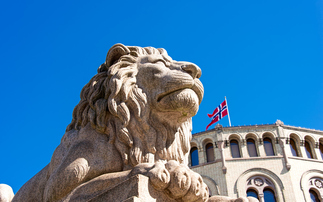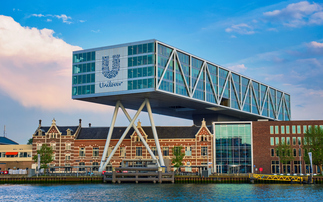In the wake of the Paris Agreement, green businesses are entering a period of opportunity and responsibility
Jeremy Corbyn once again found himself facing a bit of manufactured media outrage over the festive period for quoting the Albanian communist dictator Enver Hoxha's infamous 1967 New Year address: "This year will be harder than last year. On the other hand, it will be easier than next year." Such miserabilism may well be justified for a Labour Party that has started 2016 by maintaining its average of at least one piece of self-inflicted damage a day, but for a green economy that has faced more than its fair share of pessimism in recent years, the exact opposite outlook is now justified. This year will be better than last year, and it could prove tougher than next year.
2015 was a defining year for the global economy and all the early evidence is it could well deliver the step change in clean tech investment and emission reduction that is so desperately required. If this optimism was fuelled only by the Paris Agreement and its historic pledge to curb global emissions then it would look dangerously overblown. But it is also driven by the specific policy measures and investment commitments that accompanied the two weeks of diplomatic manoeuvring in the French capital.
Consequently, 2016 will be dominated by a host of encouraging developments for the green economy. In the US, the Obama administration's Clean Power Plan, the surprise extension of renewable energy tax credits in the week after the Paris Agreement, and the President's desire to make climate action the centre piece of his final year in office will all combine to mobilise billions of dollars of fresh clean tech investment. Expect further ambitious green policy moves before November from the outgoing administration and an election campaign where Hillary Clinton seeks to push climate action up the agenda, safe in the knowledge Republican dysfunction on the topic will not play well with independents.
In China, the government's reported plans to close 1,000 coal mines this year provide further evidence a combination of air pollution and clean tech opportunities are driving the transformation of the world's largest emitter. In Europe, the Paris Agreement has emboldened those who want to reinforce the bloc's decarbonisation plans and neutralised the main line of attack for the few countries who want to water down emission targets for 2030. In Australia and Canada new leaders have promised to increase the ambition of previously tepid national climate action plans. And in emerging markets the sharp reduction in clean energy costs coupled with the ever more visible nature of climate impacts (expect El Nino, temperature records, and escalating flood risks around the world to keep climate change in the headlines this year) will result in low carbon investment and deployment records being broken on a monthly basis.
Even in the UK, where ongoing hostility from parts of government means the outlook for green businesses is decidedly mixed, a new plan is promised to phase out coal plants and strengthen climate policies in order to ensure emissions targets are met. A clean energy investment surge is expected this year as a result of the tail end of the previous government's policy regime and there are encouraging signs this uptick in investment could continue into 2017 for offshore wind developers, nuclear operators, electric car manufacturers, smart grid pioneers, and perhaps even the solar industry, assuming falling technology costs mean it can once again bounce back from the damage inflicted by recent policy shocks. UK energy and climate policy remains extremely messy and contradictory - as evidenced once again by the wholly inadequate response to the flood crisis and the failure to recognise the urgent need to manage rising climate risks - but there are some bright spots amongst the confusion.
All of this adds up to good news for clean tech providers and those mainstream businesses that have prioritised action on climate change. Budgets will increase, investment opportunities will abound, healthy returns will be on offer through the creation of new markets, enhanced efficiencies, and reduced risks. The Paris Agreement will have a positive knock-on impact on climate-related fields, such as the global war on air pollution, the emergence of smart cities and green buildings, and the establishment of circular economies. Meanwhile, increased project investment from the likes of the World Bank and clean tech R&D spend from the likes of Bill Gates will spark further opportunities.
Conversely, stranded asset risks will increase for carbon intensive businesses and assets, the coal industry's woes will intensify and will not be helped by those often reactionary politicians fighting a rear guard action on its behalf, and governments that seek to actively undermine green economic development will become increasingly isolated. Expect plenty more carbon intensive projects to go the way of Shell's Arctic drilling plans and the Keystone XL pipeline as low oil prices, competitive clean tech alternatives, and environmental pressures combine to obliterate the investment case for high risk, low return fossil fuel and infrastructure projects.
This upbeat outlook presents businesses with two inter-related challenges. Firstly, how to take full advantage of the opportunities the low carbon transition and era-defining decoupling of global emissions and economic growth are creating. And secondly, how best to defend these opportunities and ensure the green economy's recent momentum is maintained.
For if there is one cloud on the horizon for green businesses it is to be found in those countries where encouraging decarbonisation policies look fragile in the face of a combination of ideological opposition, short term political cynicism, and Rumsfeldian known unknowns.
For example, the Paris Agreement improved clean tech investment prospects around the globe, but ratification of the deal by governments will improve them further still - just a handful of high profile holdouts could provide further ammunition to those who argue no one should try to cut emissions until everyone has agreed to do so.
Equally, the scientific illiteracy, unconcealed racism, and noxious surrealism of the GOP primary race may have lengthened the odds on a Republican taking the White House, but strange things can happen in a two horse race. A surprise victory for Trump and co would devastate green investor confidence faster than you can say ‘fascism'.
In the UK, defining battles await over the fifth carbon budget, the promised plan to meet the fourth carbon budget, the general tenor of the UK's climate strategy under David Cameron's eventual successor, and, of course, the UK's position in the EU. The way the global economy is embarking on an opportunity-filled clean tech transition at the same time as leading figures in the British government appear to have bought into a climate reckless zeitgeist created by a small cabal of fracking lobbyists, beach ball-wielding weathermen, bank-run orchestrating coal barons, an Environment Secretary who was outwitted by goal-post moving badgers, and the esteemed attendees of The Spectator lunch is one of the great political mysteries of the age.
A failure to win these crucial political and policy battles on both sides of the Atlantic could yet result in 2016 being remembered as a high water mark for the green economy in the US and UK, ahead of climate policies being sacrificed.
The flip side to the huge commercial opportunities that will be created this year for the low carbon economy is the responsibility green businesses have to provide the intellectual and economic justification for this transition. The reality is that environmental campaigners can only do so much. For many of the political and business leaders seeking to derail or decelerate the green economy, criticism from Greenpeace is a badge of honour. It is only businesses and investor who have the leverage and the power required to get those governments that are content not to honour the spirit of the Paris Agreement to think again. Rightly or wrongly, it is CEOs and investment funds who have the best chance of convincing sceptical Treasuries that decarbonisation is in everyone's long term interests.
Responsible businesses enjoyed a win in Paris and now they need to keep making the same arguments well in to 2016 and beyond. They need to use their influence to call out supposed business media commentators who speak only for fossil fuel incumbents and are more interested in ideology than their readers. They need to remind politicians that jobs, investment, security and flood defences depend on stable and ambitious climate policies. And they need to quietly point out to ambitious business and political leaders that the most admired, historically significant, and electorally successful entrepreneurs and statesmen and women of this era tend to have a progressive position on the green economy.
Make that the New Year's resolution for 2016 and 'this year will be better than last year' could quickly become the annual motto of a global green economy that is really starting to motor.
This article is part of BusinessGreen's Road to Paris hub, hosted in association with PwC.









